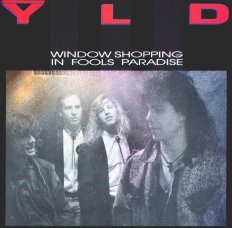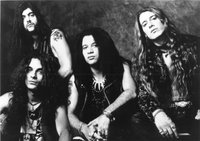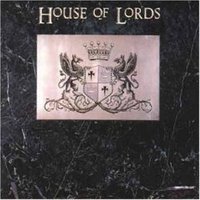Just Like Fools ParadiseOf all the great acts the ‘80s gave us, I have a particular soft spot in my heart for those that never really made it. Everybody has a favorite "wannabe" band, whether they want to admit it or not - you know, those third-tier talents that put out ragged little releases that were wholly ignored. Yet the heart and soul those maligned acts poured into their music lives on long after their chances at commercial success have died. Many bands fit this bill, but one of my personal favorites is
YLD (pronounced “wild,” their name is written with a line over the “Y”).

In 1989, the quartet released its debut (and only?) album,
Window Shopping in Fools Paradise, on the Absolute Records imprint. If you look closely at the cover, you’ll see that at least two of the band’s members are clearly wearing bolo ties – could it be that they hail from the Southwestern United States? We may never know. Here’s another brainteaser: While bands like
Motörhead,
Mötley Crüe,
Queensrÿche and others used the umlaut to signify a menacing, Germanic quality, what are we to make of YLD’s diacritical mark of choice? Is it intended as a sort of Anglicized tilda to give the band’s name a vaguely Hispanic feel while still remaining firmly Anglo?
Enough about the album cover – let’s get down to YLD’s unique brand of bolo boogie. “Wild Girls” starts the album off in raucous style with frontman
Kevin Mier Mellenbruch turning in a love-it-or-leave-it vocal performance that falls somewhere between
Accept’s
Udo Dirkschneider and
Britny Fox’s
“Dizzy” Dean Davidson. The band’s lumbering yet oddly invigorating stab at
Led Zeppelin’s “Good Times Bad Times” follows, but
Window Shopping doesn’t really get cooking until “The Distance.” This track is marked by vocal-driven, pop-indebted songwriting and guitarist
James Bengston’s eager soloing, which conjures up shades of early
Vito Bratta.
The album’s centerpiece is an uplifting cut called “Music Music” that pays tribute to the hardships and victories of life in a struggling band. Opening with a Bengston lead that sounds like an outtake from a lost ‘80s teenage flick, “Music Music” is saturated with tasty six-string escapades and heart-on-the-sleeve lyrics. When Mellenbruch sings, “On a skeleton crew, doing the graveyard shift/I was going nowhere/I took my MDR/of rock and roll/My radio blast/Guitar in hand/I lose control,” you just know he’s
lived those lyrics. Call it cheesy if you must, but you can’t take the man’s honesty away from him.
Could YLD ever have made it big under different circumstances? Probably not. But I maintain that it's the C-list talents who really make the ‘80s metal world go round. After all, where would the megastars be without all the wannabes clamoring at their feet?















